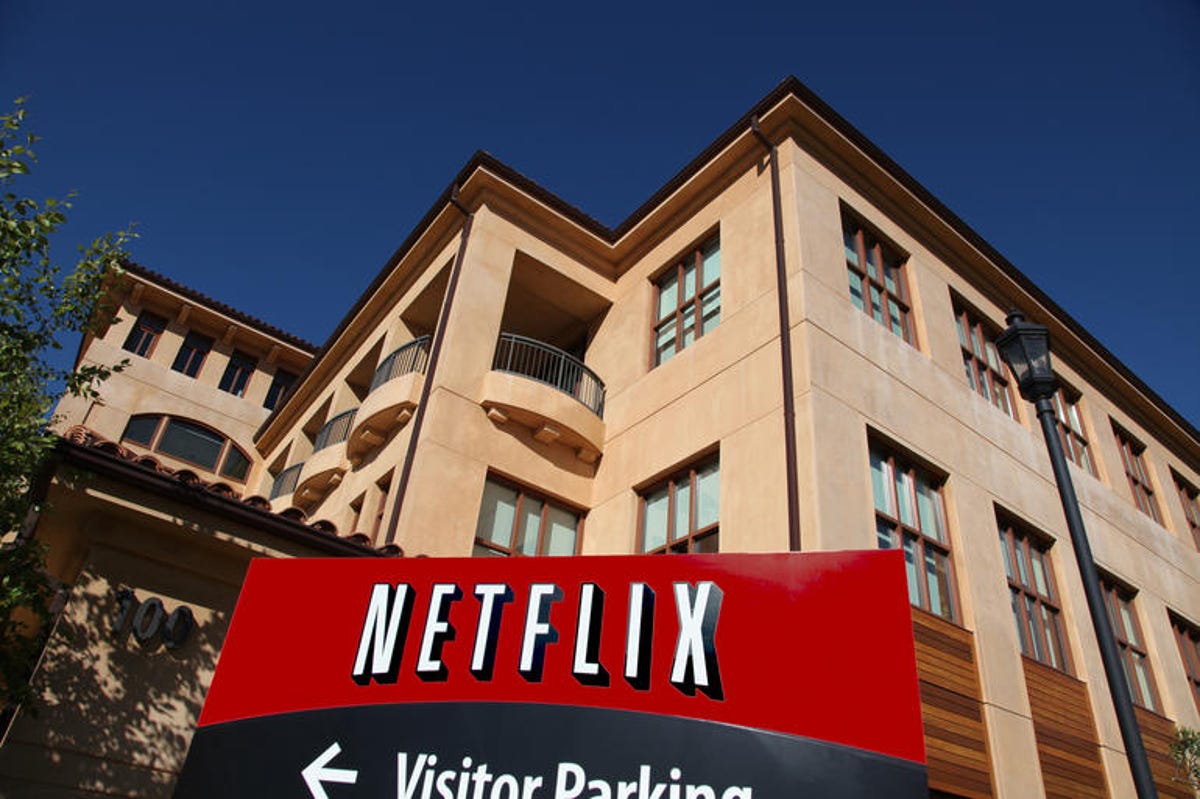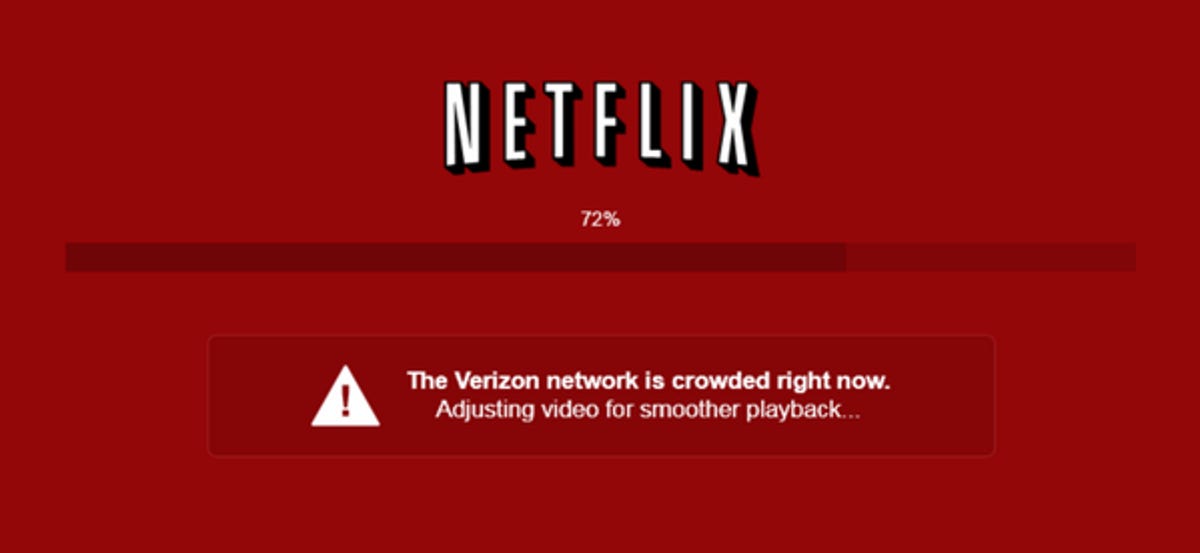
Netflix
The battle between Verizon and Netflix has gotten uglier, as Verizon fires back over Netflix’s claims that carrier’s network has caused problems with streaming video.
Earlier on Wednesday, CNET reported on an image posted to Twitter by Vox Media designer Yuri Victor showing a Netflix screen with a message about a buffering interruption to a video stream. The message wasted no time placing the blame: “The Verizon network is crowded right now.” Netflix went on to say that it was “adjusting video for smoother playback.”
After CNET’s story was published, a Verizon spokesman told CNET in an e-mailed statement that the Netflix move is “a PR stunt,” adding that his company is “investigating this claim, but it seems misleading and could confuse people.”
Verizon and Netflix have long had issues with each other. Netflix has taken aim at Verizon’s Fios network, arguing that the Internet service provider’s data speeds are too slow and that it has throttled back traffic. In an attempt to improve traffic speeds, Netflix argues, it signed a in order to get the ISP to deliver a better Netflix streaming experience.
“We have reached an interconnect arrangement with Verizon that we hope will improve performance for our joint customers over the coming months,” Netflix said at the time.
Related stories
- Netflix takes aim at Verizon over slow data speeds
- How Google found the best route for the Netflix era
- Netflix signs streaming traffic deal with Verizon
- Net neutrality debate Part II: What it means to the average Joe
- Comcast vs. Netflix: Is this really about Net neutrality?
That agreement is the topic of much debate on Wednesday. In a conversation with CNET, a Verizon spokesman said that his company has “a peering relationship with Netflix that Netflix doesn’t like.” The spokesman wouldn’t say that the message posted to Victor’s Twitter account, which has since gone viral, is an act on Netflix’s part to push back at Verizon, but did tell CNET that “it does seem sort of curious.”
Underlying the spat between the two companies is the larger concept of Net neutrality and whether traffic should continue to flow freely through networks or be metered. Netflix, of course, wants to see the free flow of traffic to keep its costs down. Most television and Internet service providers would like to have the option of charging companies like Netflix that use vast swaths of their bandwidth.
The debate over Net neutrality has no clear end in sight. But it is clear from Netflix’s latest move that the company is going to try to hold cable providers accountable to customers. So far, Verizon hasn’t said publicly how it feels about that move.
As part of its ongoing battle with service providers, Netflix has kept a scorecard of sorts on its website to identify which companies are doing the best job at delivering adequate speed for its streaming video. Google Fiber took the top spot with 3.58Mbps. Verizon Fios is in 48th place at 1.99Mbps.
It wasn’t long ago that Comcast was also far down on the list. Then in February, Netflix signed a peering agreement with Comcast to pay it to deliver a better streaming experience to their collective customers. Immediately after that agreement was made, Netflix speeds on Comcast increased by 65 percent from 1.5Mbps to 2.5Mbps. As of this writing, Comcast’s average Netflix streaming speed is 2.8Mbps.


Yuri Victor
Verizon’s jump has not been so noticeable. After the deal was inked and payments made to Verizon, Verizon’s speeds have inched to 1.9Mbps in April from about 1.77Mbps in February.
The Verizon spokesman didn’t dispute that information with CNET. He said that “nothing on our end” has changed in the quality of Verizon’s service, but added that there is no rational explanation on Verizon’s side why the video quality or network would have been an issue for Victor or other users.
Still, Verizon has bigger and better plans for its Netflix experience. The spokesman told CNET that while the peering agreement has been signed, Verizon is working at improving its network architecture to boost streaming speeds. By the end of this year, the spokesman said, Verizon expects to have a “near-market-leading Netflix streaming experience.”
“So again,” the spokesman told CNET. “It’s a PR move.”
PR move or not, Netflix is a thorn in the side of major ISPs. During peak traffic times, the company’s streaming service eats up one-third of all the bandwidth in the US. It’s that data point that ISPs have used to argue that Netflix should pay for the right to deliver so much content to users. And on several occasions, the company has caved and done so.
Although the ISPs argue that the payments level the playing field for traffic and get streaming providers to pay for transit across their networks, Netflix has said publicly that it believes it’s being charged for access to ISPs’ customers. In other words, the ISPs want a piece of the Netflix action.
Netflix has stayed somewhat quiet about the ongoing Verizon kerfuffle, deciding to let the now-viral image of its service do the talking for it.
In a statement to CNET, a Netflix spokesman said that his company is “testing ways to alert customers that their Netflix experience is impacted by congestion on a broadband provider’s network so they are aware of what’s causing their degraded experience.”
“This is a small test in the United States that is not specific to any broadband provider and started in early May,” he said.




